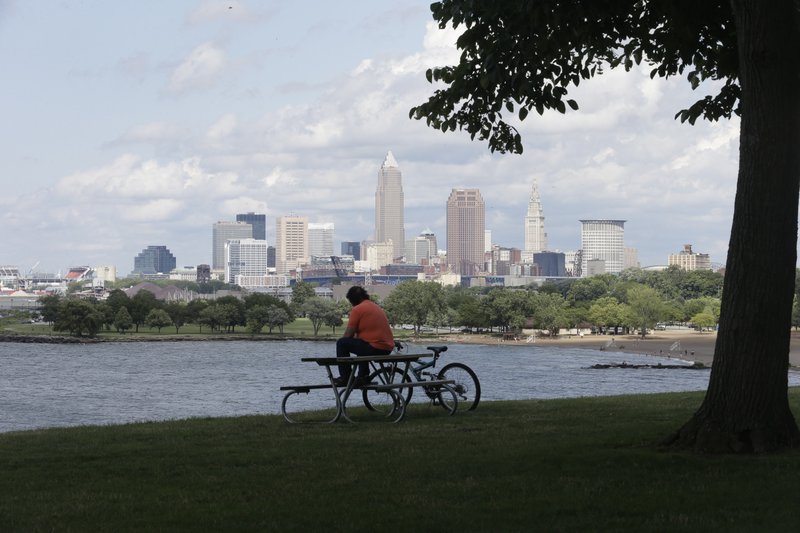WASHINGTON -- Cleveland won the unanimous backing of a Republican National Committee panel Tuesday, all but guaranteeing the GOP's 2016 presidential pick will accept the party's nomination in perennially hard-fought Ohio.
The Republicans' site selection committee backed Cleveland over donor-rich Dallas to host the 2016 national convention, and the full 168-member Republican National Committee is expected to ratify the choice next month. The move signals the role Ohio -- and its 18 electoral votes-- plays in presidential campaigns.
"As goes Ohio, so goes the presidential race," said party Chairman Reince Priebus.
The Republican National Committee did not announce a start date for the convention, but Priebus said June 28 or July 18, 2016, are the two options under consideration. An earlier-than-normal convention was a priority for Priebus, and leaders of Dallas' bid said the calendar was the main factor running against the Texas city.
"June is not an option for us," said former U.S. Sen. Kay Bailey Hutchison, who was involved in Dallas' bid. "Reince really wants June."
Paying for the convention was another consideration. The previous two GOP conventions sapped party dollars during election years, and Priebus insisted the host city not leave the central party picking up the tab.
Although Dallas had the edge on fundraising as recently as last month, Cleveland narrowed that gap and lined up early pledges toward the expected $60 million price tag.
A successful convention is a boon not just to the political party, but also to the local economy.
In a post-convention report, organizers of the 2012 GOP convention in Tampa, Fla., said its $58 million in fundraising resulted in a $214 million direct economic effect. Some 50,000 activists, officials and reporters descended on the Tampa area, officials said.
"It provides us with an opportunity to showcase not only a great city, but a great state and a great message," Ohio GOP Chairman Matt Borges said.
Cleveland has undergone dramatic redevelopment in recent years -- $4.5 billion in projects have been completed in the past decade or are about to begin construction. Its redevelopment was a big part of Cleveland's aggressive pitch to host the Republicans on the shores of Lake Erie.
"I've got to tell you: If you haven't been to Cleveland lately, it's a real surprise how beautiful it is down by that lake," Priebus said on Fox News.
Ohio's allure as a political prize also proved tempting. The last candidate to win the White House without Ohio was John F. Kennedy, a Democrat, in 1960.
During the 2012 presidential race, President Barack Obama and Republican challenger Mitt Romney made Ohio a central piece of their strategies. Combined, they spent $150 million on television ads and were frequent visitors to the state, which narrowly broke in Obama's favor.
"Ohio is the lynchpin in every presidential election," said Ohio Gov. John Kasich, a Republican.
Kasich's Democratic challenger, Cuyahoga County Executive Ed FitzGerald, said the weeklong convention alone is unlikely to determine the state's votes.
"A convention doesn't decide which way a state goes," he said.
Republicans have not won the state where they have staged a national convention since 1992, when President George H.W. Bush kicked off his re-election bid in Texas.
Cleveland last hosted the Republican convention in 1936. The GOP lost the state by 21 points. Cleveland also hosted the 1924 GOP convention, when Republicans carried the state by 35 points.
In addition to the finances, officials gave tough scrutiny to each city's transportation and hotel plans. Tampa's convention forced many delegates -- including major donors -- into hotels an hour from the convention site and was reliant on buses.
Timing, too, was a factor for officials.
Priebus wanted the convention scheduled for early summer 2016, roughly two months sooner than has become the norm. That would give the GOP's next presidential nominee quicker access to tens of millions of dollars in general election cash.
"The candidate can be broke but they're not able to raise general election money until the convention is held," Priebus said.
Democrats, meanwhile, are on their own timeline for picking a venue. Democratic National Committee officials will begin site visits with a stop July 21 in Birmingham, Ala. Other cities in contention are New York City; Philadelphia; Columbus, Ohio; and Phoenix.
Democratic National Committee Chairman Debbie Wasserman Schultz is expected to announce a host city either late this year or early in 2015.
Information for this article was contributed by Ken Thomas, Kevin Vineys, Mark Gillispie and Normaan Merchant of The Associated Press.
A Section on 07/09/2014


